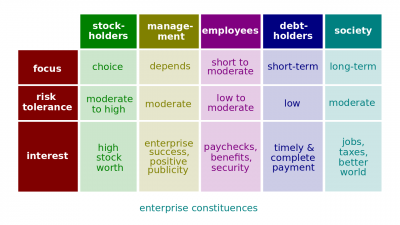Difference between revisions of "Corporate governance"
| (2 intermediate revisions by the same user not shown) | |||
| Line 1: | Line 1: | ||
| − | [[Corporate governance]] is the set of rules that control a company's behavior toward its directors, managers, employees, shareholders, creditors, customers, competitors, and community. | + | [[File:Enterprise-constituencies.png|400px|thumb|right|[[Enterprise constituency]]]][[File:Long-vs-short.png|400px|thumb|right|[[Corporate governance]]]][[Corporate governance]] is the set of rules that control a company's behavior toward its directors, managers, employees, shareholders, creditors, customers, competitors, and community. |
| Line 5: | Line 5: | ||
According to [[Financial Management Theory and Practice by Eugene F. Brigham and Michael C. Ehrhardt (13th edition)]], | According to [[Financial Management Theory and Practice by Eugene F. Brigham and Michael C. Ehrhardt (13th edition)]], | ||
:[[Corporate governance]]. The set of rules that control a company's behavior toward its directors, managers, employees, shareholders, creditors, customers, competitors, and community. | :[[Corporate governance]]. The set of rules that control a company's behavior toward its directors, managers, employees, shareholders, creditors, customers, competitors, and community. | ||
| + | According to [[Fundamentals of Financial Management by Eugene F. Brigham and Joel F. Houston (15th edition)]], | ||
| + | :[[Corporate governance]]. Establishment of rules and practices by Board of Directors to ensure that managers act in shareholders' interests while balancing the needs of other key constituencies. | ||
==Related concepts== | ==Related concepts== | ||
Latest revision as of 23:57, 3 November 2019
Corporate governance is the set of rules that control a company's behavior toward its directors, managers, employees, shareholders, creditors, customers, competitors, and community.
Definitions
According to Financial Management Theory and Practice by Eugene F. Brigham and Michael C. Ehrhardt (13th edition),
- Corporate governance. The set of rules that control a company's behavior toward its directors, managers, employees, shareholders, creditors, customers, competitors, and community.
According to Fundamentals of Financial Management by Eugene F. Brigham and Joel F. Houston (15th edition),
- Corporate governance. Establishment of rules and practices by Board of Directors to ensure that managers act in shareholders' interests while balancing the needs of other key constituencies.
Related concepts
- Financial management. A combination of enterprise efforts undertaken in order to procure and utilize monetary resources of the enterprise.

